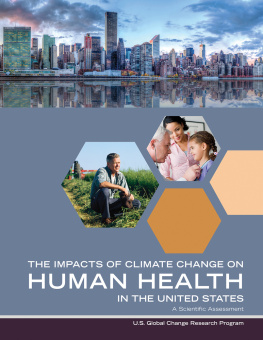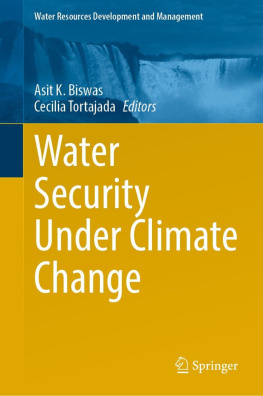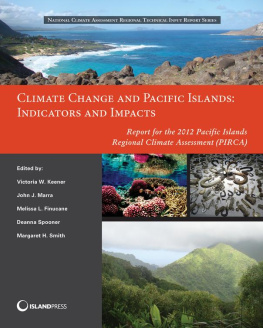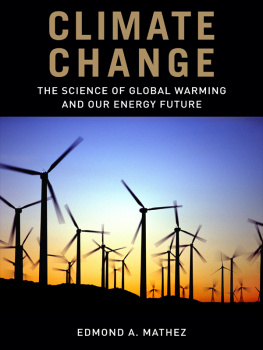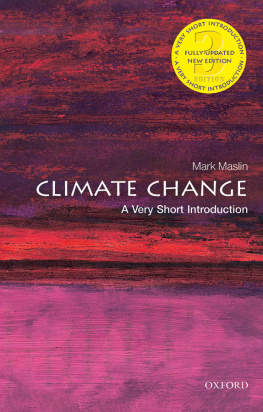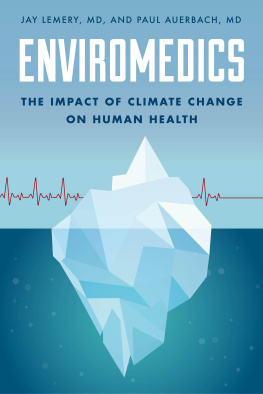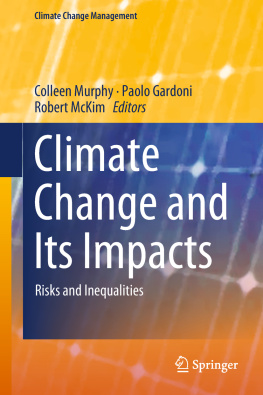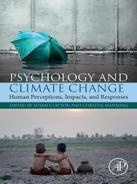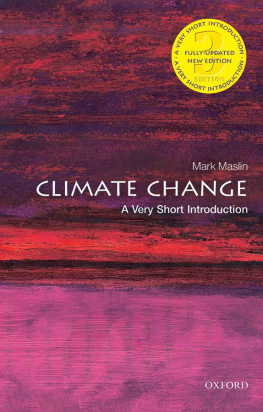To read the full report, go to: health2016.globalchange.gov
Recommended Citation: USGCRP, 2016: The Impacts of Climate Change on Human Health in the United States: A Scientific Assessment. Crimmins, A., J. Balbus, J.L. Gamble, C.B. Beard, J.E. Bell, D. Dodgen, R.J. Eisen, N. Fann, M.D. Hawkins, S.C. Herring, L. Jantarasami, D.M. Mills, S. Saha, M.C. Sarofim, J. Trtanj, and L. Ziska, Eds. U.S. Global Change Research Program, Washington, DC, 312 pp. http://dx.doi.org/10.7930/J0R49NQX
First published 2016 by the US Global Change Research Program.
First Skyhorse edition 2018.
Skyhorse Publishing books may be purchased in bulk at special discounts for sales promotion, corporate gifts, fund-raising, or educational purposes. Special editions can also be created to specifications. For details, contact the Special Sales Department, Skyhorse Publishing, 307 West 36th Street, 11th Floor, New York, NY 10018 or .
Skyhorse and Skyhorse Publishing are registered trademarks of Skyhorse Publishing, Inc., a Delaware corporation.
Visit our website at www.skyhorsepublishing.com.
10 9 8 7 6 5 4 3 2 1
Library of Congress Cataloging-in-Publication Data is available on file.
Cover design by the US Global Change Research Program.
ISBN: 978-1-5107-2609-3
Ebook ISBN: 978-1-5107-2621-5
Printed in China

April 2016
Dear Colleagues:
On behalf of the National Science and Technology Council and the U.S. Global Change Research Program, I am pleased to share this report, The Impacts of Climate Change on Human Health in the United States: A Scientific Assessment . It advances scientific understanding of the impacts of climate change on public health, highlights social and environmental disparities that make some communities particularly vulnerable to climate change, and confirms that climate change is a significant threat to the health of all Americans.
This report was developed by over 100 experts from across the Nation representing eight Federal agencies. I want to thank in particular the efforts of the U.S. Environmental Protection Agency (EPA), the U.S. Department of Health and Human Services (HHS), and the National Oceanic and Atmospheric Administration (NOAA) for leading in the development of this report. It was called for under the Presidents Climate Action Plan and is a major contribution to the sustained National Climate Assessment process. The report was informed by input gathered in listening sessions and scientific and technical information contributed through open solicitations. It underwent rigorous reviews by the public and by scientific experts inside and outside of the government, including a special committee of the National Academies of Sciences, Engineering, and Medicine.
I applaud the authors, reviewers, and staff who have developed this scientific assessment. Their dedication over the past three years has been remarkable and their work has advanced our knowledge of how human health is impacted by climate change now and in the future.
Combating the health threats from climate change is a top priority for President Obama and a key driver of his Climate Action Plan. I strongly and respectfully urge decision makers across the Nation to use the scientific information contained within to take action and protect the health of current and future generations.

Dr. John P. Holdren
Assistant to the President for Science and Technology
Director, Office of Science and Technology Policy
Executive Office of the President
 | THE IMPACTS OF CLIMATE CHANGE ON HUMAN HEALTH IN THE UNITED STATES A Scientific Assessment |
About the USGCRP Climate and Health Assessment
The U.S. Global Change Research Program (USGCRP) Climate and Health Assessment has been developed to enhance understanding and inform decisions about the growing threat of climate change to the health and well-being of residents of the United States. This scientific assessment is part of the ongoing efforts of USGCRPs sustained National Climate Assessment (NCA) process and was called for under the Presidents Climate Action Plan. USGCRP agencies identified human health impacts as a high-priority topic for scientific assessment.
This assessment was developed by a team of more than 100 experts from 8 U.S. Federal agencies (including employees, contractors, and affiliates) to inform public health officials, urban and disaster response planners, decision makers, and other stakeholders within and outside of government who are interested in better understanding the risks climate change presents to human health.
The USGCRP Climate and Health Assessment draws from a large body of scientific peer-reviewed research and other publicly available sources; all sources meet the standards of the Information Quality Act (IQA). The report was extensively reviewed by the public and experts, including a committee of the National Academies of Sciences, Engineering, and Medicine, the 13 Federal agencies of the U.S. Global Change Research Program, and the Federal Committee on Environment, Natural Resources, and Sustainability (CENRS).
About the National Climate Assessment
The Third National Climate Assessment (2014 NCA) assessed the science of climate change and its impacts across the United States, now and throughout this century. The report documents climate change related impacts and responses for various sectors and regions, with the goal of better informing public and private decision making at all levels. The 2014 NCA included a chapter on human health
TABLE OF CONTENTS
CHAPTERS
ABOUT THIS REPORT
Climate change threatens human health and well-being in the United States. The U.S. Global Change Research Program (USGCRP) Climate and Health Assessment has been developed to enhance understanding and inform decisions about this growing threat. This scientific assessment, called for under the Presidents Climate Action Plan, is a major report of the sustained National Climate Assessment (NCA) process. The report responds to the 1990 Congressional mandate to assist the Nation in understanding, assessing, predicting, and responding to human-induced and natural processes of global change. The agencies of the USGCRP identified human health impacts as a high-priority topic for scientific assessment.
The purpose of this assessment is to provide a comprehensive, evidence-based, and, where possible, quantitative estimation of observed and projected climate change related health impacts in the United States. The USGCRP Climate and Health Assessment has been developed to inform public health officials, urban and disaster response planners, decision makers, and other stakeholders within and outside of government who are interested in better understanding the risks climate change presents to human health.
The authors of this assessment have compiled and assessed current research on human health impacts of climate change and summarized the current state of the science for a number of key topics. This assessment provides a comprehensive update to the most recent detailed technical assessment for the health impacts of climate change, the 2008 Synthesis and Assessment Product 4.6 (SAP 4.6), Analyses of the Effects of Global Change on Human Health and Welfare and Human Systems . It also updates and builds upon the health chapter of the 2014 NCA. While : Introduction: Climate Change and Human Health includes a brief overview of observed and projected climate change impacts in the United States, a detailed assessment of climate science is outside the scope of this report. This report relies on the 2014 NCA and other peer-reviewed scientific assessments of climate change and climate scenarios as the basis for describing health impacts.

